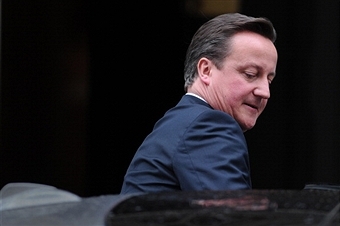‘As things stand, I don’t believe Jeremy Hunt broke the ministerial code,’ said David Cameron to Andrew Marr earlier this morning. But the prime minister reiterated that he would act if new evidence came to light when Jeremy Hunt gives evidence to the Leveson inquiry. Cameron also indicated that he would not wait until Leveson reports in October to punish a breach of the ministerial code. And if Leveson does not clear up the issue, then the Hunt case would be referred to Sir Alex Allan. ‘I know my responsibilities,’ Cameron said time and again.
In addition to putting Jeremy Hunt on probation, Cameron took the opportunity to defend his own conduct with News Corp executives. He conceded that he, and all politicians, had been too close to the Murdoch clan, and said that he ‘might do things differently’ if he had the chance – a reference to his close friendship with Rebekah Brooks. However, he insisted that he had never had ‘an inappropriate conversation about this important [BSkyB] deal’. He was adamant that there had never been a ‘big deal’ with the Murdochs in exchange for ‘support for the Conservative party.’ He also made the point that lobby is a fact of life in politics and the media, saying that the BBC were skilled practitioners in the art when it came to the licence fee and regulation. It was the only punch Cameron threw throughout the interview.
The second half of David Cameron’s self-defence concerned the economy. ‘This is the biggest issue for the government, the biggest issue for the country.’ It is, Cameron said, ‘the reason I get out of bed in the morning’. Cameron resisted Marr’s temptation to announce a short-term stimulus package, which would presumably include tax cuts demanded by Liam Fox, Boris Johnson and Ed Balls. Instead he held the line, saying that only a ‘long term’ solution would work. He said that this would be a painful process, as the ‘economy is rebalanced’ away from ‘the broken model of financial services, of debt in our banks, homes and government.’ He cited recent contracts for car manufacturing as evidence that a new economy is emerging. On the other hand, he said that the Euro-crisis was nowhere near finished yet.
Having defined the intellectual parameters of his economic policy, he began to emote about how tough it is for ordinary families. He said ‘I understand’ four times in less than a minute
– an attempt to repel Nadine Dorries’ criticism that he is out of touch. It is a criticism that 82 per cent of the population agree with, according to the latest Angus Reid poll. Cameron will hope
that this section of the interview makes the news clips, rather than his visible embarrassments talking about the Murdochs. One wouldn’t bank on it.
PS: The best economic news for the government is found in the Independent on Sunday, where Hamish McRea introduces Goldman Sachs’ new
methodology, which finds that the British economy is performing significantly better than the government’s figures would suggest.






Comments